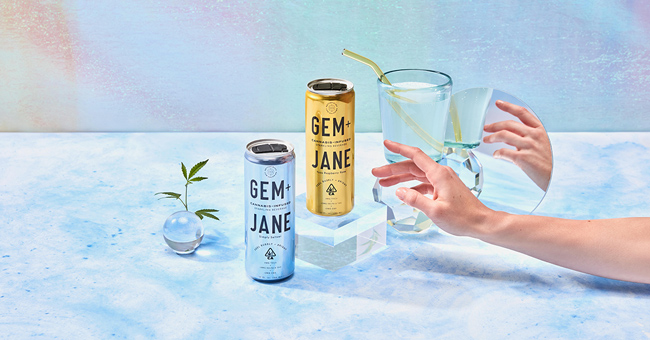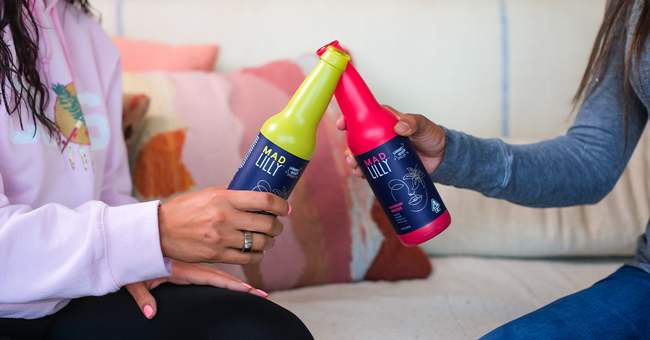Within beverages, the conversation around cannabis drinks has been similar for the past several years: the market is growing — maintaining around 1% of market share within the cannabis industry, according to a March report by research group Headset — but still in search (legal restrictions notwithstanding) of a wider breakthrough.
Yet even as new products and brands continue to pop up across regulated states, it’s the growing presence of women in the cannabis beverage category that has some seeing a bigger future. According to the same report, female consumers (across all demographics, except Gen Z) are more likely to spend more on infused beverages than men — and a new generation of brands are eager to deliver an experience that speaks directly to them.
For Santa Rosa, California-based CannaCraft, the opportunity to connect with female consumers specifically was significant enough to garner its own brand: Gem + Jane, a five-SKU line of THC and CBD-infused sparkling beverages that is billed as being “by women, for women.” Developed by CannaCraft’s chief marketing officer Angela Pih, the brand doesn’t include any explicit call-outs to its target audience, but instead adds subtle touches — the name, the soft color palette and leaning into botanical flavors, for example — to establish its appeal.
“These are not the conventional types of flavors that you would find in a dispensary. These are really discerning flavors that you would find in a more elevated or premium type of segment,” said Angela Pih, chief marketing officer at CannaCraft and the creator of Gem + Jane.
Those flavors include Elderflower Pear, Lemon Lavender Blueberry, Strawberry Hibiscus and Yuzu Rose Raspberry, each with around 20-25 calories. The line also includes a zero-calorie unflavored seltzer, the first such infused product on the market, according to Pih. But CannaCraft’s expertise as an extractor allowed it to fine tune the user experience for Gem + Jane in pointed ways. The addition of Delta THC-8 gives a “softer, gentler type of high,” Pih said, while THC-V offers low psychoactivity but also “clarity of mind” and a burst of energy; it can also help to suppress appetite, as opposed to supercharging it. That added dimension nudges Gem + Jane towards a more broadly defined lifestyle space, rather than something strictly to drink in place of alcohol.
“Women who have sampled the product and helped us with the R&D process have really noticed that you can consume one of these, then go out and have a great hike or a workout,” she said.
That sentiment underscores how much attitudes towards drinking a cannabis-infused sparkling mocktail — let alone going for a hike afterwards — are changing for both genders. For women (or for men) dabbling in cannabis products for the first time, beverages — often in familiar formats, like teas and sparkling waters — offer a discreet and less intimidating alternative to inhaled products, according to Headset analyst Liz Connors. In addition, the shift to at-home use occasions spurred by the pandemic may have encouraged further trial: according to its 2020 State of Cannabis report, delivery service Eaze reported that drinks were among the top picks for first-time customers (along with gummies and chocolate), while the number of female shoppers on the platform has increased by 10% since its launch in 2018.
Giving consumers an a low calorie, lightly intoxicating alternative to alcohol which can be consumed multiple times over a short period gives low-dose drinks a place within users’ habits; in the case of female-owned and focused infused wine makers Viv & Oak and House of Saka, swapping in for alcohol is almost intuitive.
That positioning has helped relatively grizzled veteran (and former New Beverage Showdown champion) CANN emerge as the standard bearer for the low-dose movement with its line of lightly THC- and CBD-infused “social tonics.” Though not marketed explicitly towards women, the branding is “clearly designed to appeal to female consumers,” said Connors, and getting the seal of approval (see: investment) from GOOP guru Gwenyth Paltrow likely didn’t hurt either. According to Headset data, more than 55% of CANN’s beverage sales were to women over the past 180 days, compared to 43% for males. The brand’s rapid expansion to states outside of the West Coast and Rockies has also given it a first-mover advantage in setting the market for low-dose drinks; Pih noted that Gem + Jane’s 12 oz. cans are line priced with CANN’s 8 oz. package.
But according to a recent survey conducted by The Harris Poll, an even bigger female audience could be on its way: Over 50% of parents with kids under age 18 reported using cannabis during the pandemic, with around 61% of that group adding that they plan to use again post-pandemic. Moreover, around 67% said that using cannabis makes them a better parent.
Those numbers suggest cannabis playing a deeper role in some users’ lives rather than an occasional buzz, but not always on the surface: among parents with kids under 18 who use cannabis, only 28% reported doing so openly. As founder of infused drink maker K-Zen, which commissioned the Harris Poll, Judy Yee has made breaking the stigma of cannabis use for women and specifically mothers one of her main goals.
“As an active mom and CEO who started incorporating cannabis into my daily routine before the pandemic, I’m not surprised that parents are turning to it during these tough times,” Yee said on her website “Moms For Mary.” “Once parents have incorporated cannabis into their daily routine and experienced the benefits for their own health and well-being, I think it will be challenging for them to go back to life without cannabis.”
Yee is aiming to deepen those connections with “Moms For Mary,” Mad Lilly’s online community and resource base for parents and cannabis users. The site features testimonials and stories from moms, including Yee, about how they incorporate cannabis into their daily lives in a way that supports both their goals in terms of personal health and as parents — topics range from “Backyard Cannabis Growing with My Children” to “Being the Neighborhood CannaMom” With the pandemic adding a profound new level of stress on top of existing challenges, the window of opportunity for exploring THC, CBD and other cannabinoids is open, and Yee is eager to help women find a healthy relationship with the plant.
“It was important for me and my team to support and celebrate fellow moms who feel this and why decided to launch Moms for Mary, a community of moms sharing their stories and experiences with cannabis,” she said. “It’s our aim to inspire those who are curious to discover how the plant can improve their overall well-being and contribute to ending the unfair stigma surrounding parents’ and responsible cannabis usage.”

